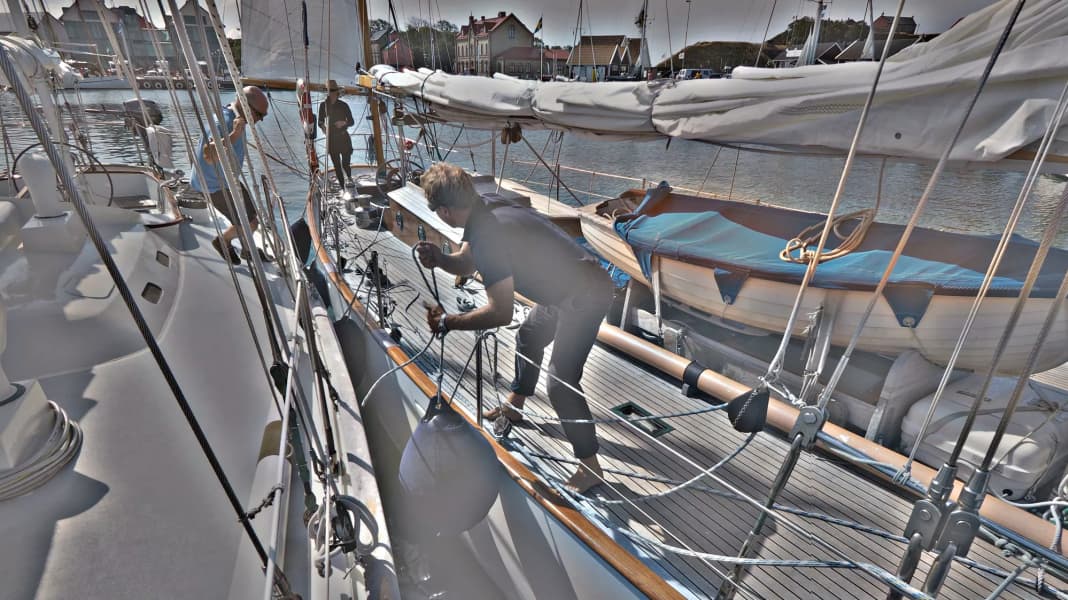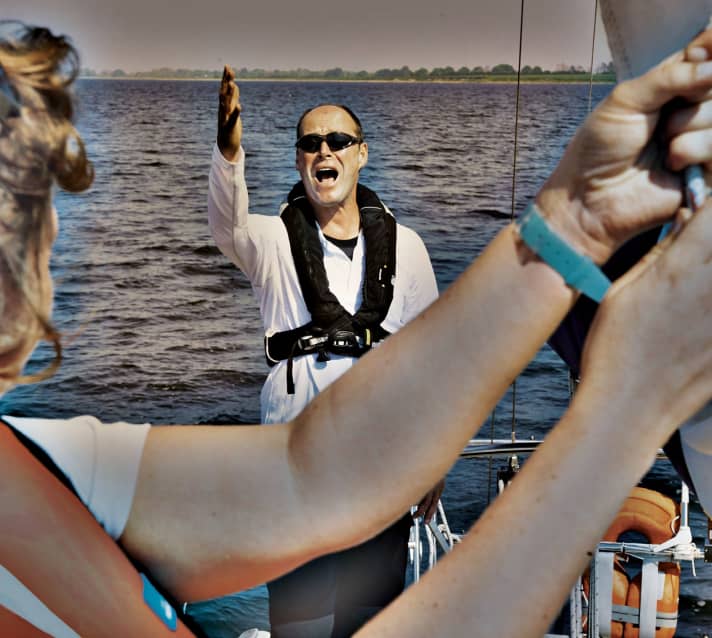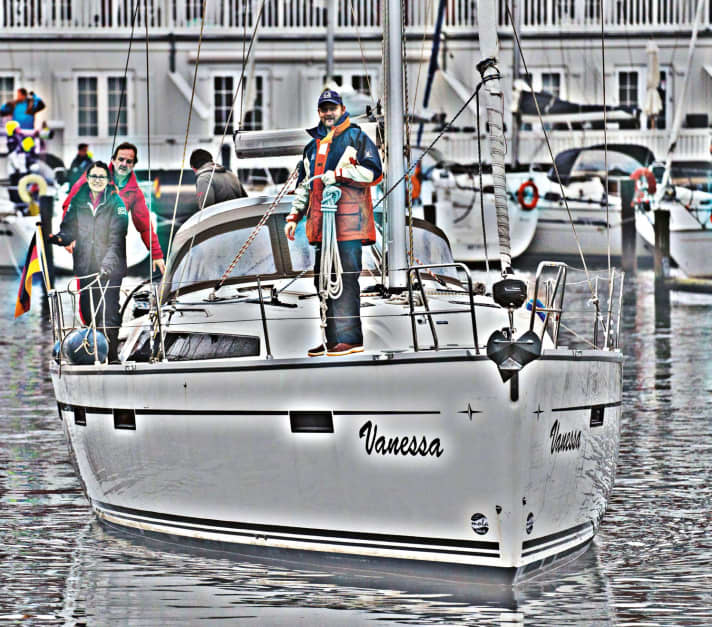
It's that time again, despite the drizzle. The crowd crawls out of their saloon caves and cake stalls to get ready for the afternoon performance, some with coffee, beer or a nice cocktail. It's just before 4pm. They'll be here soon. For sure.
No, no orcas have yet been spotted in the Danish South Sea heading for Sønderborg harbour. Nor has any gold treasure from a Spanish armada been unearthed. No, no. Much more interesting: The pack awaits the charter crews from Flensburg, who now have to overcome their second major hurdle after an endlessly long boat handover: the first mooring of the trip, which for many will also be the first of the year.
A celebration for all those who have already moored: the shellbacks, the frequent sailors, the regatta cracks and charterers who have completed their harbour manoeuvres. Now it's the turn of the others.
Waiting for the first manoeuvre
"They're coming!" The mast of the first ship to arrive pushes forward behind the pier towards the entrance, slowly turning in the direction of jetty A. And the pack waits while the crew stand there in life jackets and keep a concentrated lookout. You can literally feel how much the new arrivals wish they could do their manoeuvre in peace and quiet, without the pressure of the assembled jetty crew.
"Look at the shoes he's wearing, he'll slip as soon as he jumps onto the jetty," says someone from the boat next door, and a little bit of hope resonates. The wrong shoes, the wet jetty - yes, it could be something to look at.
"They probably want to moor alongside and don't even have any fenders out yet," we hear from the port side. What seems to be about to happen remains unspoken. "He'll fall over as soon as he steps over" and "Without fenders, that can't go well, it's guaranteed to cause a mishap!"
These scenes take place in almost all harbours, preferably when it is windy or very crowded or when a particularly large number of newcomers try to moor up in boats they are not very familiar with. There is even a word for it that sounds somewhat harmless and like entertainment: harbour cinema.
The degree of malicious glee and spitefulness expressed may vary, as may the maliciousness of the commentary. But hardly anyone is completely free of malice and sensationalism, not even those who sometimes have to suffer from it themselves, because not every manoeuvre works for them either.
There are many reasons for schadenfreude
Why is it like that? Why do people on their securely moored boats literally go on harbour cinema watch so as not to miss a small disaster? They even toast each other in anticipation that hopefully something is about to happen in the harbour, which they can then talk about in detail with their neighbours later.

Conflicts between helmsmen and crew fuel the drama that often plays out in marinas
There is rarely a shortage of occasions for a certain degree of perfidy. Just because someone has a bigger boat than you, he's already an arrogant varnish monkey. If a young couple motors into the marina on a Hallberg-Rassy, it is of course "sponsored by dad", and it is quite clear that the spoilt brats can't do anything. If, contrary to expectations, their manoeuvre goes perfectly, it can only be a coincidence.
Bochum-based psychologist and sailor Daniela Maier explains the phenomenon as follows: "The interesting thing about schadenfreude is that someone else suffers damage without the observer themselves experiencing any tangible benefits. Instead, they experience an exclusively mental gain. This can become all the greater when envy is added."
The box seat at the harbour cinema not only satisfies the sheer desire for sensation, but also helps to compensate for one's own deficits.
Meanwhile, in the guest area of the Sønderborg marina: the charter crew is actually considering mooring alongside, even though there are no fenders ready yet. It would be the simplest, most logical manoeuvre. Disappointment is already wafting over jetty A like fog. That would be too easy!
Luckily, someone suggests an empty box on the forecastle. Fortunately, it's too small. But the sailors don't know that - how could they? The marina is foreign to them, the boat and its dimensions unfamiliar. Good only for the gawkers!
Charter crews are often victims
And then the next ship approaches, another charter boat. The pack bends towards the new arrivals. A man in oilskins is standing at the bow with the fore line in his hand, looking frantically. At the wheel, another is barking orders. Two women with mooring lines wait crouched at the height of the shrouds, looking like intimidated little birds. They look over and perhaps hope that someone will give them confidence, even a tip: "Seat 65 is free! We'll help in a minute!"
But bridge A is just waiting, literally lurking. Something is bound to happen soon.
How does the crew feel? The sailors standing there, slightly lost on deck, have paid a lot of money for one or two weeks of charter and have been looking forward to this time for months. Now they are finally on board, underway, full of anticipation, but also accompanied by a feeling of latent insecurity, of not being enough.

How does the crew feel, sailing their first mooring with a foreign ship in a foreign harbour against a large backdrop?
The skipper: overwhelmed. The crew: intimidated. The weather: harsh autumn. All they really want to do is get this pier over with and then spend a nice evening together. But then there are the onlookers, people with stone-faced eyes who look like the two grandpas in the Muppet Show. Terrible!
"Look, see if that box next to the Moody is red, look how wide it is, look, now look!"
"It's far too narrow," says one of the muppets precociously, quietly enough so that the charter crew can't hear. It would be even nicer if you made the manoeuvre easier for them.
Is it going well? Or is it crashing? Is the box wide enough or too narrow? And is it better to help, support, give tips - or let the others do it first?

The helmsman takes a swerve; he just wants to tie up in this box, no more searching, no more running the gauntlet. Without making any arrangements, he dashes between the dolphins and the inevitable happens: Poles crunch, the crew panic, the pack grunts.
"I could have told you straight away," says someone two ships away, not at all quietly.
In the meantime, the crew of the first charter boat has decided to take the side seat. Because, as everyone has now realised, the box is too narrow. Meanwhile, the drizzle turns into a downpour.
At least there is a helper ready for the lines, which also fly. It's just a shame that they're not attached to the cleats. And then there's the matter of the missing fenders. The helper is standing there with the fore line in his hand and watches helplessly as the ship drifts lengthways against the jetty and then into the stern of a motor yacht. More harbour cinema.
What an afternoon! It was worth not going out today! Because "we as boat owners can afford it, we don't just have one week, but if we want, we always have a season! Not the poor devils there, but seriously, how can you be so stupid! The charter company won't applaud that!"
Unintentionally becoming the leading actor - fortunately, one could almost say, this doesn't just affect charter sailors. The chance of public failure is undoubtedly greater, as are the yachts in most cases. But there are manoeuvre stunts worth seeing everywhere.
Here we have the classic case of someone casting off all the lines, clutching in with a flourish - and only then realising that the power cable is still in the junction box. That the yacht has already passed the dolphins before realising that a child, a dog or both are missing.
In Sønderborg, at jetty A, the following scene even took place: a boat comes in, an angry red man at the tiller, his wife hanging from a line in the wake. As it turned out later, the two had fallen out so much on their trip that she had jumped into the water in anger - and he had refused to get her back on board. Of course, their argument didn't end there, oh no! It dragged on until the woman, once she was back on board, had changed into dry clothes, picked up her mobile phone and handbag and left the boat, and later possibly her husband too.
These are stories that are great to laugh about, as long as you are not affected yourself. Scenes that you normally only see in slightly over-the-top comedies. And yet this is not a film, but real, real life. This is probably why there is usually a feeling of shame when you - intentionally or unintentionally - become a spectator.
Some, on the other hand, go out of their way to provoke a scandal. And they feel so self-righteous that they don't even keep their dark thoughts to themselves. This is what happened in a busy city harbour on the Baltic Sea, near Hack.
"Ah, look, they look like they can't do anything. Maybe something will happen! Nah, don't go and help," said a skipper to his crew as a family approached the guest jetty in their 32-foot yacht.
Someone else assisted the poor, frozen souls, who were travelling on their new boat for the first time, and invited them directly on board for a pot of hot tea, where the heating was already running. Help instead of harbour cinema. Although that doesn't always go down well either. There are sailors who are so full of themselves that even the offer to take their lines is perceived as presumptuous. "Nah, give me a break! I'd better do that on my own." This is another way of offending people. Solidarity, helpfulness and camaraderie can also be damaged in this way. What a shame, because isn't that what makes sailing so special?
Steffi von Wolff

